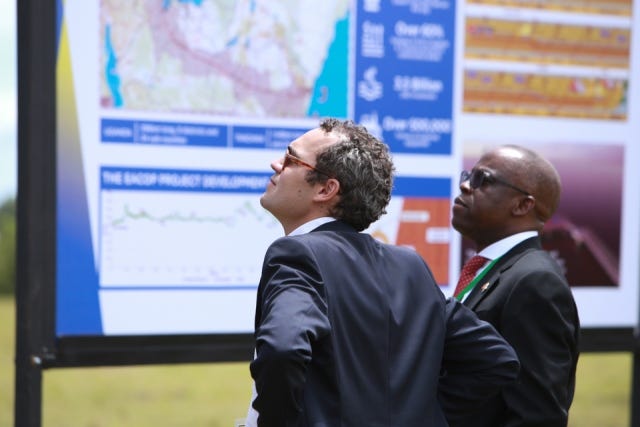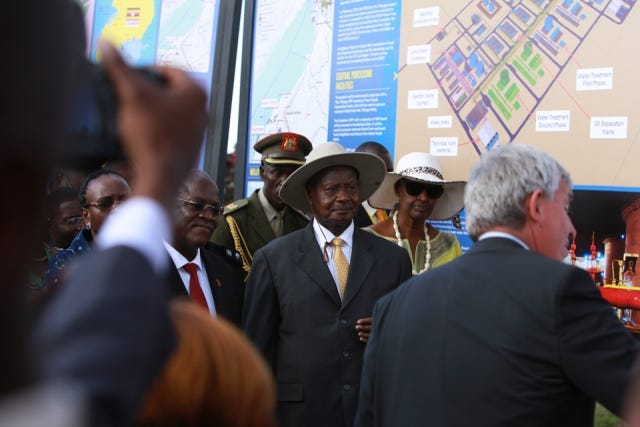#38 - A crude deal for East Africa
By Mat Hope in London, UK, and Maina Waruru in Nairobi, Kenya.
Welcome to this latest edition of From a Climate Correspondent. If you'd like to support us, you can invite us for a coffee over at our Patreon page. Thanks for reading!

Representatives at the laying of the cross-border mark stone for the East Africa Crude Oil Pipeline. Image: © East African Crude Oil Pipeline
Every now and then, a decision is made that seems so startingly out of step with global trends that you have to stop and double check.
In recent weeks, BP has doubled down on its promise to get to net-zero emissions, big oil has been declared as undergoing a “slow death” by one of the world’s foremost financial dailies, all while huge swathes of the African continent suffer severe flooding.
What a time, then, for Uganda and Tanzania to sign a deal for East Africa’s first major oil pipeline.
Good COP, EACOP
It’s a far cry from the kind of deal that countries continue to promise they will deliver at the delayed annual climate talks, COP26, due to be conducted in the UK in November 2021.
As recently as January, the hosts of the meeting announced £50 million of investments in clean energy technology on the continent, supposedly a symbol of the contributions richer countries will be expected to make to ensure Africa pursues a green development path.
In that context, a deal that lays the groundwork for a final investment decision on the East Africa Crude Oil Pipeline (EACOP), which would run for 1,443 kilometres from western Uganda to the Indian Ocean port of Tanga in neighbouring Tanzania, displacing communities and cutting through some of the world’s most important nature reserves along the way, certainly stands out.
The multimillion dollar pipeline is supported by the two nations’ governments and is being developed by China National Offshore Oil Corporation and the London Stock Exchange-listed Tullow Oil, alongside French multinational Total, which is leading the project.
Amos Wemanya, a campaigner with Greenpeace Africa, told my DeSmog colleague Maina Waruru that the project was too risky, and too out of step with Africa’s supposed clean development plans, to make any sense.
“The future provides Africa with pronounced opportunities to see a lot of exciting renewable energy projects realised. African leaders need to make hard choices to harness the opportunities in solar, geothermal, and wind power that are abundantly available and drop the unnecessary ambitions for the risky energy sources such as fossil fuels,” he said.
He and other campaigners point out that it’s hard to take African leaders’ climate promises seriously – or the promises of European countries whose companies continue to exploit the continents’ fossil fuels – when such major dirty infrastructure deals are not only being struck, but celebrated.

Uganda’s President Yoweri Museveni at the laying of the cross-border mark stone for the East Africa Crude Oil Pipeline. Image: © East African Crude Oil Pipeline
Local impacts
It’s not just international climate diplomacy at stake.
At the time of writing, almost one million people have signed a petition calling for an end to this “Total madness”. Campaign group Avaaz, which organised the petition, said the impact of the pipeline on low-income communities was a major concern. Local groups were reporting that families were being displaced without compensation, they said, urging Africa’s governments not to invest in “dirty technologies from the past, pushing us close to climate chaos”.
Alongside those problems sit the risks of being a dissenting objector in those countries. Charles Wanguhu, Coordinator of the Kenya Civil Society Platform for Oil and Gas, said that due to the “militarisation” of the industry in Uganda, “it is going to be hard for communities to speak out against land or environmental injustices”.
Other than French company Total, British company Tullow, Chinese company CNOOC, and the leaders of militarised and strongman-led governments in countries shortly due to hold elections, it’s hard to find anyone the deal actually benefits.
Yet still, in 2020, with the climate crisis supposedly still at the top of many countries’ agendas, the deal is on.
Must reads from the region
Severe floods hit 760,000 people in West and Central Africa, Boureima Balima, Thomson Reuters Foundation
This short feature offers a brief glimpse into the devastating impact of floods affecting large parts of Africa, attributed to climate change, land degradation and poor urban planning that has led to more frequent disasters as rapidly-growing cities struggle with the rainfall.
Battle from Below: The South African miners fighting climate change, Kim Harrisberg, Thomson Reuters Foundation
“Artisanal miners”, derogatorily known by their Zulu label ‘zama-zamas’, are fighting from within to get South Africa to break its dependence on coal mining -- for the sake of their children and the future of the planet.
Oil-backed trade group is lobbying the Trump administration to push plastics across Africa, Emma Howard, UnEarthed
The American Chemistry Council, a trade group that lists some of the world’s largest polluters as members, recently founded a $1bn initiative that pledges to create “a world free of plastic waste”. It has also been lobbying against changes to an international agreement that puts new limits on plastic waste entering low- and middle-income countries, this story reveals.
Africa It’s Time to Make Big Polluters Pay, Philip Jakpor and Helen Neima, This Day
Rather than bemoan the fact that COVID-19 has made them sit at home, campaigners across Africa mobilised to create a social media storm. Their ask? To demand polluting industries be held accountable for the damage they’ve done to the continent and the world’s climate.
What else I have been listening to:
How to Save a Planet, by Alex Blumberg and Dr. Ayana Elizabeth Johnson
A podcast from ‘Team: Let’s Not Screw Ourselves’ about solutions to climate change. I normally eschew techno-optimist pieces on any medium, but at the moment I spend most of my time awake at unsociable hours holding a small baby and blimey Gimlet knows how to tell a story. It’s worth a try (the solutions they explore, and the podcast).
Who we are
From A Climate Correspondent is a weekly newsletter run by four journalists exploring the climate crisis from around the globe.
Lou Del Bello is an energy and climate journalist based in Delhi, India.
Jocelyn Timperley is a climate journalist based in San José, Costa Rica.
India Bourke is an environment journalist based in London, UK.
Mat Hope is investigative journalist based in Nairobi, Kenya.
Been forwarded this email?
Did someone send this on to you? Why not sign up yourself!


